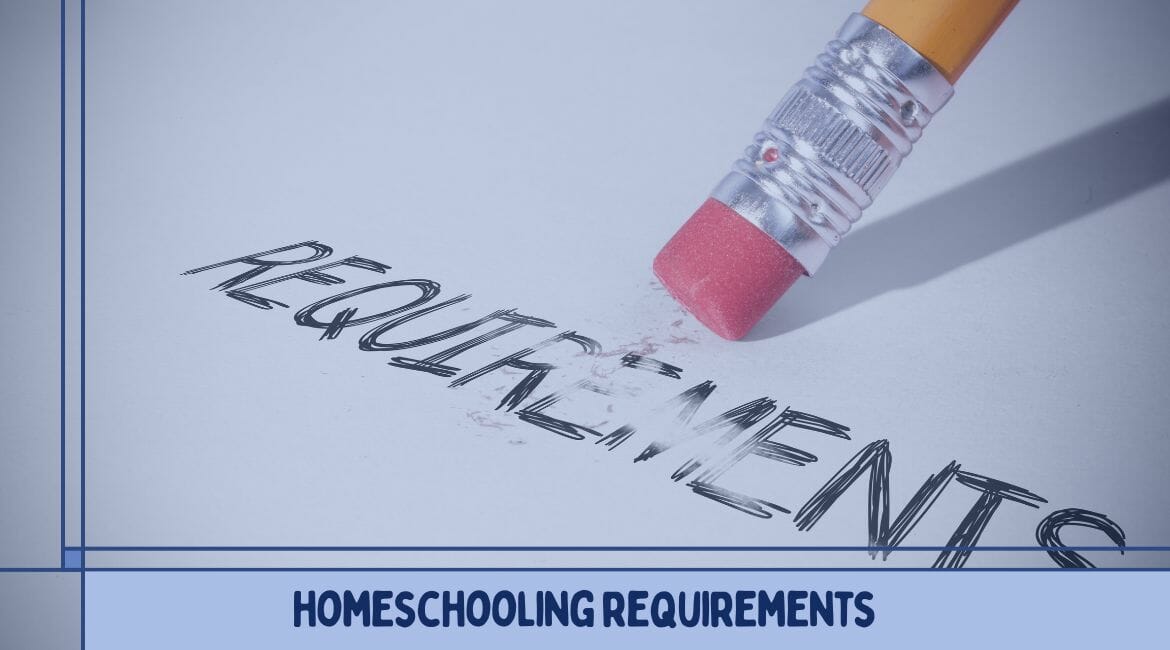Homeschooling is a growing trend in the United States, with an estimated 3% of school-age children being homeschooled. This option allows families to have more control over their children’s education, tailor it to their individual needs and interests, and spend more time together as a family. However, homeschooling can also be a significant commitment and may not be the right choice for every family. If you’re considering homeschooling your child, it’s important to research the laws and homeschooling requirements by State. Every state has its own set of rules and regulations for homeschooling, and it’s important to make sure you are in compliance with these requirements.
Notify Your Local School District
The first thing to do when starting your homeschool journey is to notify your local school district of your intent. Depending on where you live, this process can be as simple as sending an email or letter to your local public school principal. In other states, you may need to file paperwork or submit an application form directly to the public school. Be sure to check with your local school district for specific instructions.
How to Make the Notification
If you are considering homeschooling your child, one of the first steps you’ll need to take is to notify your local school district. Remember that homeschooling is a significant commitment and requires careful planning and preparation. The process for doing this will vary depending on your state’s laws and regulations, but here are some general steps you can follow to notify your local school district about your intention to homeschool.
Research Your State’s Homeschooling Laws
It’s important to understand the specific requirements for homeschooling in your state, as they can vary significantly. You can find information about homeschooling laws in your state by contacting your local school district or state education agency, or by researching online resources such as the Homeschool Legal Defense Association (HSLDA). Here is some examples of the homeschooling laws in some states:
Arizona: Parents or guardians who wish to homeschool their children in Arizona must file a notice of intent to homeschool with the local school district. The notice must include the names and ages of the children being homeschooled, as well as the curriculum being used.
California: Parents or guardians who wish to homeschool their children in California must file a private school affidavit with the California Department of Education. The affidavit must include the names and ages of the children being homeschooled, as well as the curriculum being used.
Florida: Parents or guardians who wish to homeschool their children in Florida must file a notice of intent to homeschool with the local school district. The notice must include the names and ages of the children being homeschooled, as well as the curriculum being used.
Contact Your Local School District
Once you have a good understanding of the homeschooling laws in your state, you’ll need to notify your local school district of your intention to homeschool. This may involve filing a form or letter indicating your intent to homeschool, and may also require you to provide certain information about your child’s education and your homeschooling plans.
Provide Required Documentation

Some states may require you to provide documentation when you notify the school district of your intention to homeschool. This may include proof of your child’s age, vaccination records, or other information. Be sure to check with your local school district to find out what documentation is required.
Follow Up
After you have notified the school district of your intention to homeschool, it’s a good idea to follow up to ensure that your notification was received and that you are in compliance with the relevant laws and regulations. This may involve checking in with the school district periodically to provide updates on your child’s progress or to ask for guidance or support.
Curriculum Requirements
The curriculum requirements for homeschooling in the United States vary by state. Some states have very few requirements for the curriculum that homeschooled children must follow, while others have more stringent regulations. Here are some examples of the types of curriculum requirements that may be in place in different states:
State Approved Curriculum
State-approved curriculum refers to educational materials and programs that have been officially recognized or approved by a state’s department of education for use in public schools. These materials and programs meet the state’s standards for education and are considered to be of high quality.
State-approved curriculum may include textbooks, online resources, and other instructional materials that are used to teach subjects such as math, science, language arts, and social studies. Some states also have specific guidelines or requirements for curriculum in certain subjects, such as history or foreign language.
In some states, homeschooling parents may be required to use state-approved curriculum or to follow state curriculum standards when teaching their children at home. In other states, homeschooling parents have more flexibility in choosing the materials and resources they use for their children’s education. It is important for homeschooling parents to be familiar with the homeschooling laws and regulations in their state, including any requirements for curriculum.
Record Keeping
Record keeping for homeschooling refers to the process of maintaining records of a child’s homeschooled education. These records may include attendance records, grades, course descriptions, and other information related to the child’s education.
Record keeping is important for several reasons. It helps parents to track their child’s progress and ensure that they are meeting educational goals. It also provides a record of the child’s education for future references, such as when applying to college or for other academic or professional opportunities.
In some states, homeschooling parents are required to keep certain records or to submit reports to the local school district or state education department. For example, parents may be required to maintain attendance records or to provide evidence of the child’s progress in their education. It is important for homeschooling parents to be familiar with the record-keeping requirements in their state and to maintain accurate and complete records of their child’s homeschooled education.
High School Graduation Requirements
High school graduation requirements for homeschooling vary by state in the United States. Some states have specific requirements that homeschooled students must meet in order to receive a high school diploma, while others have more flexible guidelines.
Here is a general overview of high school graduation requirements for homeschooling in some states:
Testing Requirements

Some states also require that parents administer standardized tests (or have them administered by a third party) throughout the year or at certain points in the year such as during midterms or finals periods. The tests must meet certain criteria determined by each state in order for them to count towards meeting the homeschooling requirements in that particular state. It’s important that parents understand testing requirements before beginning their homeschool experience so they know what is expected of them throughout the year.
In addition, many states offer resources and support systems for homeschoolers including support groups, co-ops, and even online classes taught by certified teachers that can be used towards meeting educational goals set forth by each individual student’s home school district.
Qualifications
Some states in the United States have requirements for the qualifications of the person responsible for teaching homeschooled children. This means that these states have specific guidelines or requirements that the person teaching homeschooled children must meet in order to be considered qualified to teach.
These requirements may include a requirement that the person has a teaching certification, which is a formal credential that is issued by a state’s department of education to individuals who have completed a state-approved teacher preparation program. A teaching certification typically indicates that the person has completed the necessary coursework and has met other requirements, such as passing a state-mandated teacher certification exam.
In addition to teaching certification, some states may have other requirements for the qualifications of the person responsible for teaching homeschooled children. For example, a state may require that the person has a certain level of education, such as a bachelor’s degree in education or a related field.
Most states also mandate that parents teaching their children at home have a high school diploma or equivalent. This means that the parent must have graduated from high school or have completed an equivalent program, such as a state-recognized high school equivalency exam, in order to be eligible to homeschool their children.
It is important for homeschooling parents to be familiar with the homeschooling laws and regulations in their state, including any requirements for the qualifications of the person responsible for teaching their children.
How Does World Schooling Differ from Homeschooling According to State Requirements?
World schooling and homeschooling may seem similar, but when it comes to state requirements, there are some key differences. While homeschooling typically follows state regulations and curriculum at home, world schooling is a more flexible approach. It allows families to travel and explore the world while incorporating educational experiences as part of their children’s education. This introduction to world schooling highlights the unique aspect of hands-on learning in various locations, which sets it apart from traditional homeschooling.
Conclusion – Homeschooling Requirements by State
Homeschooling offers parents a great way to provide quality education for their children outside of traditional schools and classrooms. However, it is important for parents who choose this route to understand the specific requirements for their particular state before getting started on this journey. By familiarizing yourself with the laws and regulations in place where you live, as well as taking advantage of resources available through support systems offered in many states, you can ensure that both you and your child are successful in navigating these unique educational waters!
Here are some links to resources that provide more detailed information about the requirements of homeschooling by state:
– [Homeschool Legal Defense Association](https://www.hslda.org/legal/)
– [National Home Education Research Institute](https://nheri.org/research/state-homeschool-laws/)

